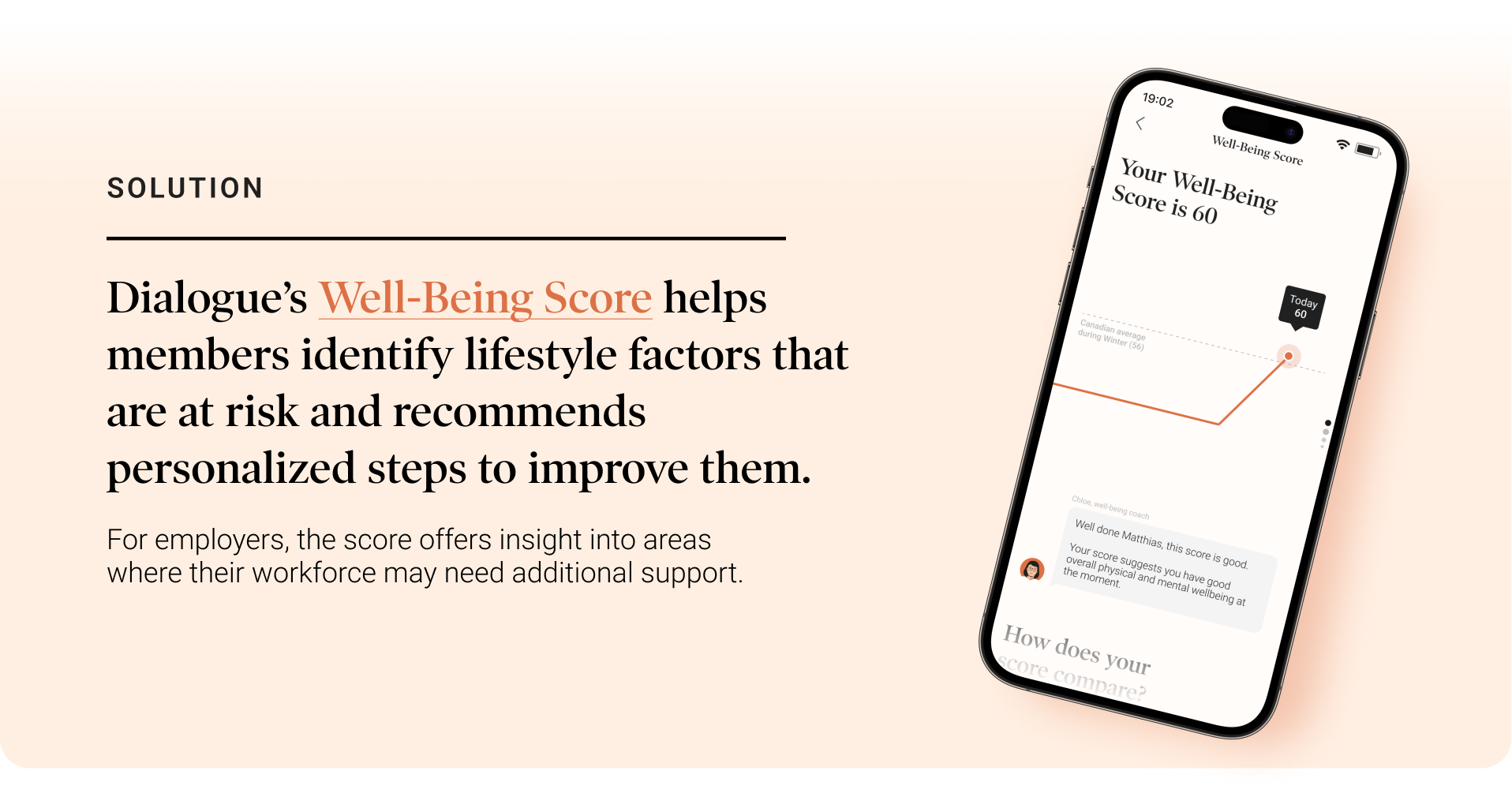Employers and employees are increasingly recognizing the value of tailored benefits. A survey of over 2500 employees found that 93% consider the ability to customize their benefits a "must-have" or "nice-to-have" option.
A one-size-fits-all approach to employee well-being falls short in today's diverse workforce.
Instead, we must offer personalized care to cultivate an engaged, satisfied, and productive environment. As work evolves, so must our strategies for fostering employee well-being and health.
Addressing disparities in employee benefits provision
8 in 10 organizations already offer a wellness program. That’s great news. But there’s still a notable gap in meeting the diverse care needs of Canadian workers. For many, the current benefits landscape fails to adequately address their health concerns and priorities.
Here's a closer look.
Lack of health assessments
Challenge: Only 33% of employers offer health assessments — a critical tool for understanding and addressing the health needs of their workforce. This is particularly surprising considering the growing interest among Gen Z employees in preventative health and screening tools.
Insufficient support for caregivers
Challenge: Currently, half of Canadian employees are caring for a loved one, be it a child or older family member. But less than 10% of employers offer childcare or eldercare programs. This oversight leaves caregivers, who often juggle work and caregiving duties, without the necessary support to manage their responsibilities effectively.
Solution: A comprehensive employee assistance program should include support for family and relationship matters, including parenting, family dynamics, and assistance in navigating childcare or eldercare — relieving some of the mental load that most caregivers experience.
Mental health disparities
Challenge: 2SLGBTQ individuals are more than twice as likely as heterosexual individuals to experience a mental health disorder in their lifetime. They may have trouble finding healthcare providers who are knowledgeable and sensitive to their needs, which limits their access to appropriate care.
Meanwhile, racial and ethnic minorities frequently experience language barriers, cultural insensitivity in healthcare settings, and limited access to affordable care. In fact, racial and ethnic minorities have higher rates of delaying or skipping necessary treatment.
Solution: Tailored benefits can improve access to high-quality healthcare for vulnerable populations. For example, Dialogue professionals receive training in culturally safe practices and anti-oppression methods, ensuring respectful care. They also adhere to standards set by organizations like the World Professional Association for Transgender Health (WPATH).
Learn about Dialogue's commitment to inclusion.
The pitfalls of generic care
Turnover and talent drain
Personalized benefits show an employer’s commitment to supporting individual needs, building loyalty and drawing in top talent in a competitive market. Workers today place a high value on their well-being, and companies that neglect personalized health benefits could lose their best talent to employers who are making better benefits investments.
Missed opportunities for organizational growth
If your employees aren’t feeling happy and healthy, they can’t do their best work. With tailored benefits, your team can overcome health concerns and maintain good health, which enables them to be more productive, innovative, and engaged — driving long-term success.
Underutilization of benefits
Employees are less likely to use benefits that don’t align with their needs. This can lead to wasted resources and a lack of return on investment for your organization. Plus, if employees don’t trust their benefits, the risk of untreated health problems and higher healthcare costs in the long run increases.
What is personalized care?
Personalized care prioritizes holistic care with quick access to suitable treatment, shared decision-making, and empowering patients to be active in their healthcare choices.
It provides the appropriate level of intervention, steering clear of unnecessary or inadequate treatments. This model focuses on connecting patients with the right healthcare provider for their needs and providing a tailored treatment plan. If needed, this includes follow-ups, referrals, and guidance for long-term health.
By considering the whole person rather than just the symptoms, personalized care aims to deliver a more effective, comprehensive, and satisfying healthcare experience, where every patient feels their care is truly about them — all while delivering better health outcomes.
.png?width=1128&height=815&name=Frame%209%20(1).png)
Comparing these approaches reveals that personalized care addresses health issues at their core, providing lasting improvements to quality of life, not just quick fixes.
The benefits of personalized care
Personalized care not only enhances employee well-being but also delivers significant benefits to the business.
Centralized referrals and follow-up flexible work arrangements
Effective care is best delivered through a centralized platform, streamlining referrals between care professionals to address various needs. For instance, a mental health specialist might recommend a career counsellor. With access to the member's health record, each clinician can ensure accurate treatment, benefiting the employee and optimizing the care process.
Clinicians can also follow up with members to assess treatment progress and determine if changes or extra care is necessary. This promotes treatment adherence and speeds up recovery.
Improved employee health and productivity
With tailored care, organizations are better positioned to help employees treat health issues and manage chronic conditions. It accelerates return to function for those recovering from illness or injury, reduces absenteeism, and supports seamless transitions back to full productivity.
Enhanced employee engagement and morale
Show your employees that you value them. When you tailor your support to meet each person’s unique needs, it enhances their sense of belonging and significantly boosts their job satisfaction and loyalty. This strategy also demonstrates your organization's commitment to diversity, equity, and inclusion, as you acknowledge and respect the varied experiences within your workforce.
Reduced healthcare costs
Tailored preventative care solutions can reduce healthcare costs for both employees and the organization. Early intervention and targeted support prevents the escalation of health issues, resulting in fewer medical expenses and lower insurance premiums over time.
Do more for your employees and your business
EAPs and wellness programs are widespread. While these initiatives are valuable and can even be customized to some degree, they often lack the integration needed to fully address employees’ multifaceted needs.
Tailored care, like the one offered through Dialogue’s Integrated Health PlatformTM, takes personalization to the next level.
With centralized access to an EAP, wellness program, mental health support, and primary care within a single platform, employees benefit from seamless and comprehensive care that delivers measurable health outcomes.
Learn why top employers prioritize personalized care experiences when investing in a benefits plan.




 Canada (EN)
Canada (EN)
 Global (EN)
Global (EN)









